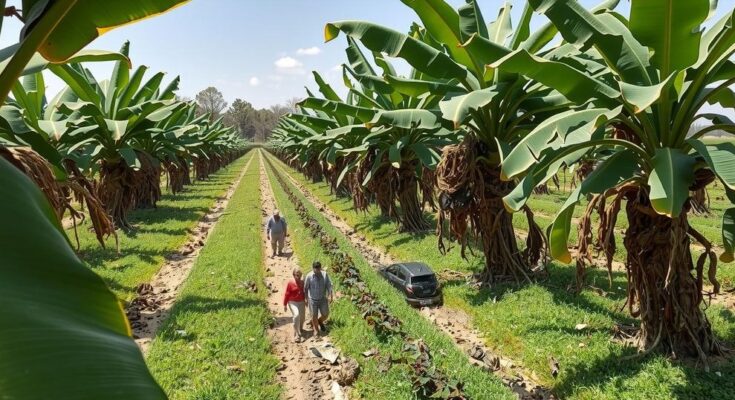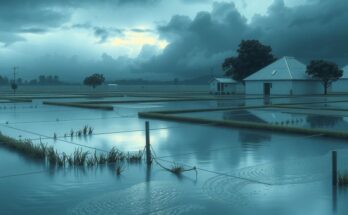The banana industry in Formosa, Argentina, has suffered a staggering loss of half its plantations due to drought and frost, reducing banana plant acreage from 1,000 to 500 hectares. Despite requesting aid from the government, producers have yet to receive assistance, leaving them in a precarious financial situation. Agricultural leaders emphasize their capacity to significantly boost production if provided with adequate support and resources.
In Formosa, Argentina, the banana industry has faced catastrophic challenges, culminating in the destruction of half of its banana plantations at the start of 2024. The province, which once boasted 1,000 hectares of banana plants, now stands at only 500 due to severe drought conditions followed by frost that devastated crops in August. Despite meeting with government representatives to request assistance, nearly 100 days have passed without any support.
Pánfilo Ayala, the president of the Federación Agraria Argentina’s Laguna Naineck branch, highlighted that the costs necessary to maintain production are prohibitively high for local producers. “We have not had any production since August. The drought of the first four months hit us hard. Things improved in May and June, but in August three frosts destroyed the production completely,” he stated. Producers expressed their dire situation, noting that profitability remains at zero until April, with production levels plummeting well below minimum requirements. Many have resorted to drastic measures, reportedly driving tractors over their crops amid frustration.
During their audience with Agriculture Secretary Sergio Iraeta, producers learned that any financial aid would be contingent upon the Ministry of Economy. Ayala noted, “The Secretary of Agriculture told us that he considered that aid was necessary because of the situation we face, but that he could not do anything from his Ministry. Unfortunately, they are not interested or do not care.”
Despite the setbacks, Ayala affirmed the region’s potential, stating, “If the government gives us the opportunity, we are prepared to produce more than 20,000 hectares of bananas in the province of Formosa. We have the production capacity to supply the 500,000 tons that Argentineans consume.”
The banana industry in Formosa has been critically impacted by adverse weather conditions and ineffective governmental support. Prolonged droughts, coupled with frost, have led to significant crop destruction, raising concerns among local producers regarding their sustainability and economic viability. The meeting with government officials emphasizes the bureaucratic challenges faced by agricultural sectors in obtaining timely financial assistance to recover from such natural disasters. In Argentina, the banana sector plays a crucial role in food supply and local economies, especially in regions like Formosa. With producers expressing their inability to meet basic production costs, the situation reflects broader systemic issues within agricultural policy and resource management in the country. Understanding the implications of these events is essential for assessing the future of banana farming in Formosa and Argentina as a whole.
The crisis within Formosa’s banana industry underscores the urgent need for governmental intervention and support for local producers facing severe economic and environmental challenges. As weather-related disasters continue to ravage agricultural sections, effective policies and timely aid are crucial to ensure agricultural sustainability and food security. The significant potential for growth in banana production remains contingent on responsive governance and strategic investment in the sector. Overall, the struggles faced by Formosa’s banana producers highlight the interplay between environmental factors, economic pressures, and the role of government in supporting essential agricultural industries.
Original Source: www.freshplaza.com




